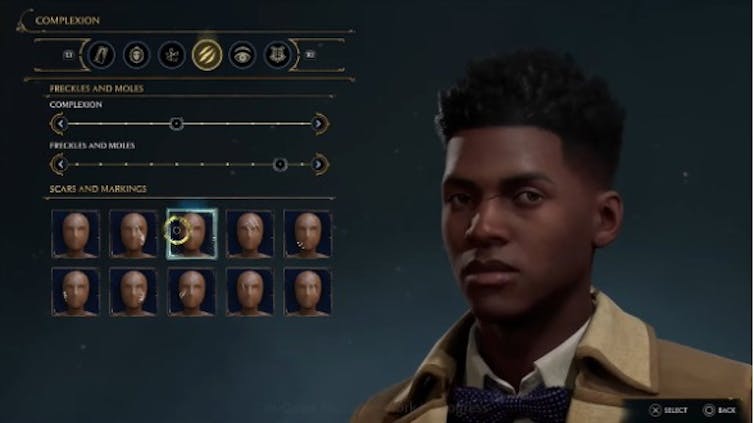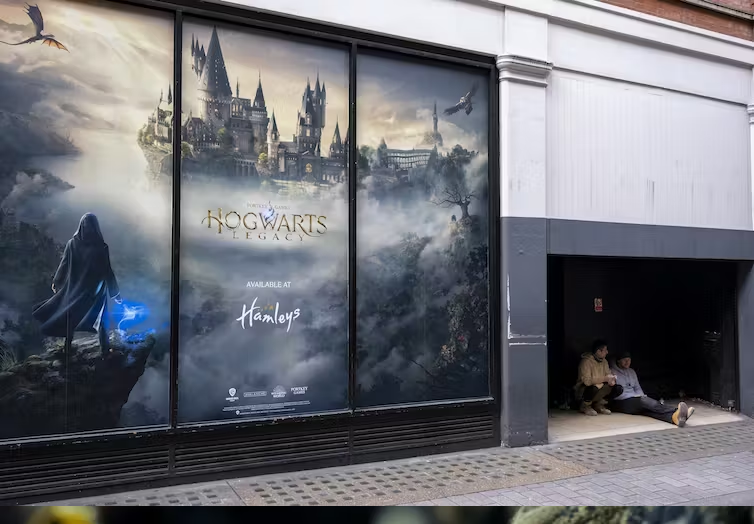The bestselling title is already a serious contender for the Game Awards’ Game of the Year. (Mike Kemp/In Pictures via Getty Images)
Steven Dashiell, American UniversityWhen the computer game Hogwarts Legacy was released in February 2023, some critics wondered whether the controversy surrounding J.K. Rowling – whose Harry Potter franchise inspired the game – would hurt sales.
Those supporting the trans community had called for a boycott of the game.
The British author has become a bête noire of many people in the trans community, repeatedly expressing and supporting views like the unfounded belief that trans women are a danger to cis women.
Nevertheless, the game, which gives players the opportunity to be young wizards making their way in the Potterverse, has proved immensely popular, selling north of 12 million copies in the two weeks after its launch. It’s already sold more units than the bestselling game of 2022, and it’s seen as a serious contender for the Game Awards’ Game of the Year.
But as a social scientist who studies gaming subcultures, I’ve been particularly interested in Hogwarts Legacy’s large following among Black gamers, who, like millions of others, seem more than willing to overlook the calls to boycott the title.
‘That wizard game’
In 2017, Rowling infamously supported social media posts seen as transphobic. Some fans wanted to know whether her beliefs were misconstrued or if she herself actually held anti-trans views.
Since then, she’s doubled down on her beliefs, penning a long post replete with stereotypes: that the trans movement is a “cover to predators,” and that it’s “seeking to erode ‘woman’ as a political and biological class.” Her refusal to reconsider these views has drawn the ire of queer communities and their allies, and Rowling’s supporters and detractors routinely spar on social media.
When Warner Bros. Games announced in September 2020 that it would be producing Hogwarts Legacy, those angry about Rowling encouraged gamers to refrain from purchasing the title.
While Rowling didn’t make the game or offer any developmental input, some LGBTQ activists believed that the game’s success would signal a tacit acceptance of her views on gender. Some of them even refuse to reference the game by its name, instead calling “that wizard game.”
‘Black folks done took over Hogwarts’
While the enthusiastic response to the game may have dismayed some activists, I saw it as a testament to the powerful draw of the franchise, which has attracted millions of fans through books, movies, apparel and theme parks over the past 25 years.
In the game, players assume the role of a new student at Hogwarts School, where they learn magic before putting on the famous “sorting hat” and embarking upon a shadowy quest to earn the respect of their instructors.
The love of this world – and the nostalgia it evokes – seems to supersede the problematic views of the creator.
And yet the game’s popularity among Black gamers might come as a surprise.
The Harry Potter books always had a broad legion of fans. Many American students – including Black students – were introduced to the Potterverse in their school years and retained a love for the characters and their adventures.
While J.K. Rowling included a handful of characters who were people of color in her books, their scant representation could be read as tokenism, at best. And long before the trans controversy, some Harry Potter fans criticized Rowling for what I call “hindsight representation”: long after the books were published, Rowling claimed that certain characters were of different ethnicities or sexual orientations, without directly highlighting their diversity in the texts.
Nonetheless, gaming boards dedicated to Black gamers were abuzz after the release. The game has gained such a foothold in the Black gaming community that one Facebook commenter triumphantly announced that “Black folks done took over Hogwarts and turned it into an HBCU” – a reference to historically Black colleges and universities.
Gaining a foothold in a white male world
Gaming subcultures have long been what sociologist Eric Dunning calls “male preserves” – spaces dominated by men. These spaces are not necessarily exclusionary; women and minorities can freely take part.
But if you aren’t a white man, it’s important to adhere to the norms and expectations in order to be accepted into the community.
Communication scholar Mia Consalvo has written about how gamers work to acquire what she calls “gamer capital” – expertise, slang and accomplishments that reflect status in gaming subcultures. The requisite benchmarks, the language used and the knowledge that’s valued have traditionally been dictated and determined by white men.
So in order to gain clout within gaming networks, gamers tend to downplay their race, gender or sexuality. And because of a default thinking that the gamer on the other side of the screen is a white male – and a prevalence of games that historically ignore issues of race, gender and sexuality – diversity in the gaming world can be easily erased.
For these reasons, it’s been easy to ignore or dismiss the presence of minority gamers, and Black gamers often struggle to be seen.
In recent years, however, that’s started to change.
In games like Forspoken and Dungeons & Dragons, developers have prioritized different genders, races and ethnicities to acknowledge the diversity of players. In the newest edition of Dungeons & Dragons, for example, the image of “human” for the race descriptions is a Black woman. In Forspoken, gamers play as Frey, a young Black girl from New York.
And this is related to what I see happening in Hogwarts Legacy. Many Black players are applauding the game’s character creator, which offers a great deal of flexibility in making avatars. In particular, those who want to play as Black characters have a vast range of skin colors, hairstyles and hair textures to choose from – choices most digital games lack.

As scholars like Kimberly Moffitt have pointed out, hair is a central element of African American identity. Complex and thoughtful options for hairstyles in video games represent a significant shift in the recognition of Black gamers – one that challenges the kind of erasure in gaming subcultures that my research has identified.
Separating the work from the creator
How does this square with Rowling’s transphobia, and the calls to boycott the video game?
And, does this speak to the age-old belief from political science that Black Americans are socially conservative and therefore more likely to overlook homophobia or transphobia?
I would say no.
Black popular culture has a complicated relationship with the separation of artists from their work. Disgraced luminaries like R. Kelly, Kanye West and Michael Jackson generate sometimes paradoxical associations for Black people: They’re iconic Black artists who, in their personal lives, have committed crimes or expressed hateful ideas.
So many Black gamers are primed to separate Hogwarts Legacy from Rowling, particularly since the game makes huge strides in representation.
Furthermore, research overwhelmingly shows that a large majority of younger Black Americans are not socially conservative.
So in my view, their desire to be represented in games that have long excluded them serves a broader goal that likely outweighs any negative feelings toward Rowling.![]()
Steven Dashiell, Postdoctoral Research Fellow in Sociology, American University
This article is republished from The Conversation under a Creative Commons license. Read the original article.
